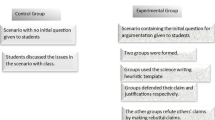Abstract
Drawing upon recent research, this article reviews the theory underlying the use of socioscientific issues (SSI) in science education. We begin with a definition and rationale for SSI and note the importance of SSI for advancing functional scientific literacy. We then examine the various roles of context, teachers, and students in SSI lessons as well as the importance of classroom discourse, including sociomoral discourse, argumentation, discussion, and debate. Finally, we discuss how SSI units, which encourage evidence-based decisionmaking and compromise, can improve critical thinking, contribute to character education, and provide an interesting context for teaching required science content.
Similar content being viewed by others
References
Aikenhead, G. S. (2006).Science education for everyday life: Evidence-based practice. New York: Teachers College Press.
Bell, P., & Linn, M. C. (2000). Scientific argumentations as learning artifacts: Designing for learning from the Web with KIE.International Journal of Science Education, 22, 797–817.
Benninga, J. S., Berkowitz, M. W., Kuehn, P., & Smith, K. (2003). The relationship of character education implementation and academic achievement in elementary schoolsJournal of Research in Character Education 1(1), 19–32.
Berkowitz, M. W. (1997). The complete moral person: Anatomy and formation. In J. M. DuBois (Ed.),Moral issues in psychology: Personalist contributions to selected problems (pp. 11–42). Lanham, MD: University Press of America.
Berkowitz, M. W., Battistich, V. A., & Bier, M. C. (2008). What works in character education: What is known and what needs to be known. In L. Nucci & D. Narvaez (Eds.),Handbook on moral and character education (Chapter 22). Mahwah, NJ: Lawrence Erlbaum Associates.
Berkowitz, M. W., & Grych, J. H. (2000). Early character development and education.Early Education and Development, 11(1), 55–72.
Berkowitz, M. W., Oser, F., & Althof, W. (1987). The development of sociomoral discourse. In W. M. Kurtines & J. L. Gewirtz (Eds.),Moral development through social interaction (pp. 322–352). New York: John Wiley.
Facione, P. A. (2007).Critical thinking: What it is and why it counts (2007 update). Millbrae, CA: Insight-Assessment/California Academic Press LLC. Retrieved April 28, 2009, from www.insightassessment.com/pdf_files/what&why2006.pdf.
Fowler, S. R., Zeidler, D. L., & Sadler, T. D. (2009). Moral sensitivity in the context of socioscientific issues in high school science students.International Journal of Science Teacher Education, 31(2), 279–296.
Kolstø, S. D. (2006). Patterns in students’ argumentation confronted with a risk-focused socio-scientific issue.International Journal of Science Education, 28(14), 1689–1716.
Levinson, R. (2006). Towards a theoretical framework for teaching controversial socio-scientific issues.International Journal of Science Education, 28(10), 1201–1224.
Pouliot, C. (2008). Students’ inventory of social actors concerned by the controversy surrounding cellular telephones: A case study.Science Education, 92, 543–559.
Ratcliffe, M., & Grace, M. (2003).Science education and citizenship: Teaching socio-scientific issues. Buckingham, UK: Open University Press.
Ratcliffe, M., Harris, R., & McWhirter, J. (2004). Teaching ethical aspects of science: Is cross-curricular collaboration the answer?School Science Review, 86(315), 39–44.
Sadler, T. D. (2004a). Informal reasoning regarding socioscientific issues: A critical review of research.Journal of Research in Science Teaching, 41(5), 513–536.
Sadler, T. D. (2004b). Moral and ethical dimensions of socioscientific decision-making as integral components of scientific literacy.The Science Educator, 13, 39–48.
Sadler, T. D., & Zeidler, D. L. (2005). The significance of content knowledge for informal reasoning regarding socioscientific issues: Applying genetics knowledge to genetic engineering issues.Science Education, 89(1), 71–93.
Walker, K. A., & Zeidler, D. L. (2007). Promoting discourse about socioscientific issues through scaffolded inquiry.International Journal of Science Education, 29(11), 1387–1410.
Wellington, J. (2004). Ethics and citizenship in science education: Now is the time to jump off the fence.School Science Review, 86, 33–38.
Zeidler, D. L. (2003).The role of moral reasoning on socioscientific issues and discourse in science education. The Netherlands: Kluwer Academic Press.
Zeidler, D. L. (2007).An inclusive view of scientific literacy: Core issues and future directions. Paper presented at “Promoting Scientific Literacy: Science Education Research and Practice in Transaction,” LSL Symposium, Uppsala, Sweden.
Zeidler, D. L., & Keefer, M. (2003). The role of moral reasoning and the status of socioscientific issues in science eudcation: Philosophical, psychologicla and pedagogical considerations. In D. L. Zeidler (Ed.),The role of moral reasoning and discourse on socioscientific issues in science education (pp. 7–38). The Netherlands: Kluwer Academic Press.
Zeidler, D. L., & Sadler, T. D. (2008a). The, role of moral reasoning in argumentation: Conscience, character and care. In S. Erduran & M. Pilar Jimenez-Aleixandre (Eds.),Argumentation in science education: Perspectives from classroom-based research (pp. 201–216). The Netherlands: Springer Press.
Zeidler, D. L., & Sadler, T. D. (2008b). Social and ethical issues in science education: A prelude to action.Science & Education, 17(8, 9), 799–803. (Guest Editors for Special Issue on Socio-Ethical Issues in Science Education).
Zeidler, D. L., Sadler, T. D., Applebaum, S., & Callahan, B. E. (2009). Advancing reflective judgment through socioscientific issues.Journal of Research in Science Teaching, 46(1), 74–101.
Zeidler, D. L., Sadler, T. D., Simmons, M. L., & Howes, E. V. (2005). Beyond STS: A research-based framework for socioscientific issues education.Science Education, 89(3), 357–377.
Zeidler, D. L., Walker, K. A., Ackett, W. A., & Simmons, M. L. (2002). Tangled up in views: Beliefs in the nature of science and responses to socioscientific dilemmas.Science Education, 86(3), 343–367.
Author information
Authors and Affiliations
Corresponding author
Rights and permissions
About this article
Cite this article
Zeidler, D.L., Nichols, B.H. Socioscientific issues: Theory and practice. J Elem Sci Edu 21, 49–58 (2009). https://doi.org/10.1007/BF03173684
Accepted:
Issue Date:
DOI: https://doi.org/10.1007/BF03173684



